The Need To Communicate Relationship Needs
In a survey, 87% Americans admitted that while in a relationship, they have said something under stress that they later regretted.
Do you know the single biggest reason behind saying something nasty that one might regret later? – The absence of timely communication of one’s needs to their partner.
It’s why you cannot ignore learning how to communicate your needs in a relationship.
I admit it’s difficult to express your relationship needs, and I know exactly how it feels.
First, you do not realise you may have needs, so you ignore them. You want to be a good partner so you fulfil all your partner’s needs to make them happy. You hope that making them satisfied will automatically fulfil your needs too. But that’s wishful thinking!
When you start experiencing inner dissatisfaction and relationship issues, you finally feel the need to express your needs. However, you may not know how to identify, articulate, and communicate them to your partner. You are also concerned about how your partner will react and whether it will hurt the relationship. These inner battles keep you struggling and anxious.
But communicating your relationship needs to your partner is your only hope. You cannot let your fears stop you from opening up to them. Ignoring your needs or keeping them to yourself can make you become someone you are not. It can hurt your partner, fill you with guilt & regret, and even threaten the relationship itself.
The good news? You can learn to identify and express your needs fearlessly to your partner. To make it even easier, we will know it in impactful yet straightforward baby steps.
First, we will understand what needs in a relationship really are. Then, we will explore the various types of relationship needs and the different ways to express them. And finally, we will learn how to communicate your needs in a relationship, along with addressing some challenges that you may face along the way.
I have also added a bonus section just for you. I will provide you with some unique signs to confirm that you have communicated your needs effectively and that they have been received well by your partner.
Let’s begin.
What Are Relationship Needs?

Relationship Needs are the basic requirements that must be fulfilled to be one’s best self, both personally and in a relationship. Among other purposes, its primary objective is to ensure you stay your true and authentic self. Thus, fulfilling relationship needs helps protect your identity and strengthens your individuality and self-confidence.
Emotional intimacy is a prime example of essential needs in a relationship. In a relationship, it’s a basic need for someone to feel attended, understood, and respected by their partner. It makes them feel valued, supported, and loved unconditionally.
When you cry, your partner may show empathy by sitting beside you or offering a hug. They would whisper in your ear, “Everything will be fine,” and it feels believable—no judgment, no questions, just understanding, love, and care. When emotional needs are quietly met like this, you feel healed in no time, no matter how complicated life feels.
Relationship Needs vs Relationship Wants: Key Differences
Relationship needs are often confused with ‘wants,’ but they are far from being similar. Here are the key differences between the two.
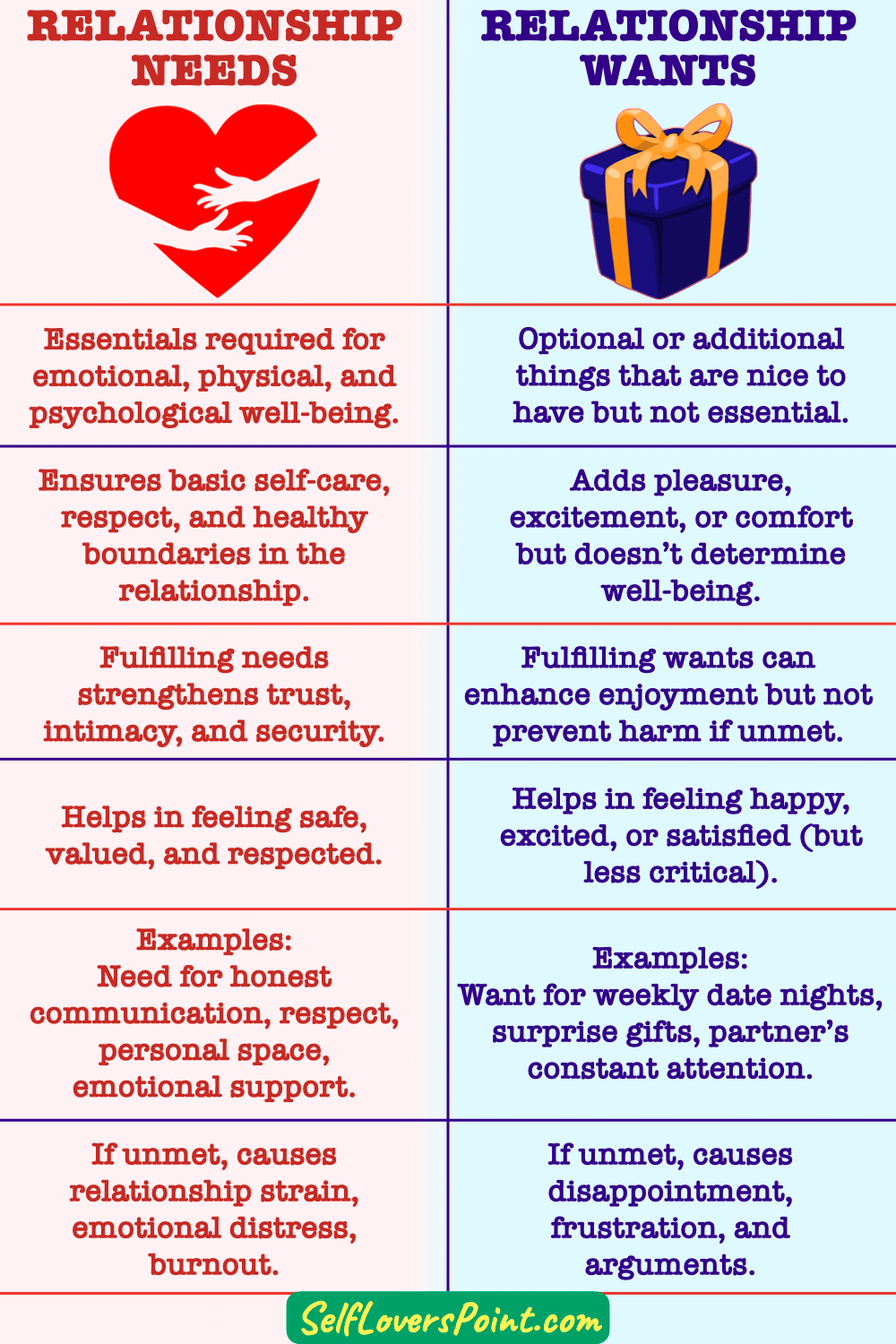
Did you notice? While ‘needs’ are the basic requirements in a relationship, ‘wants’ are relatively “higher-hanging fruits.” If you push too hard for your wants, you may risk overburdening your partner and thus harming the relationship. To get your wants fulfilled, instead of pressuring your partner, either ask them politely or wait for your wants to happen organically.
‘Expectations’ and ‘Demands’ are two milder and stronger forms of Wants, respectively, and can be equally harmful.
Here is how ‘needs’ strengthen the chemistry in a relationship, while “crossing the line” and entering the territories of expectations, wants, and demands weaken it.
Relationship Needs vs Wants vs Expectations vs Demands
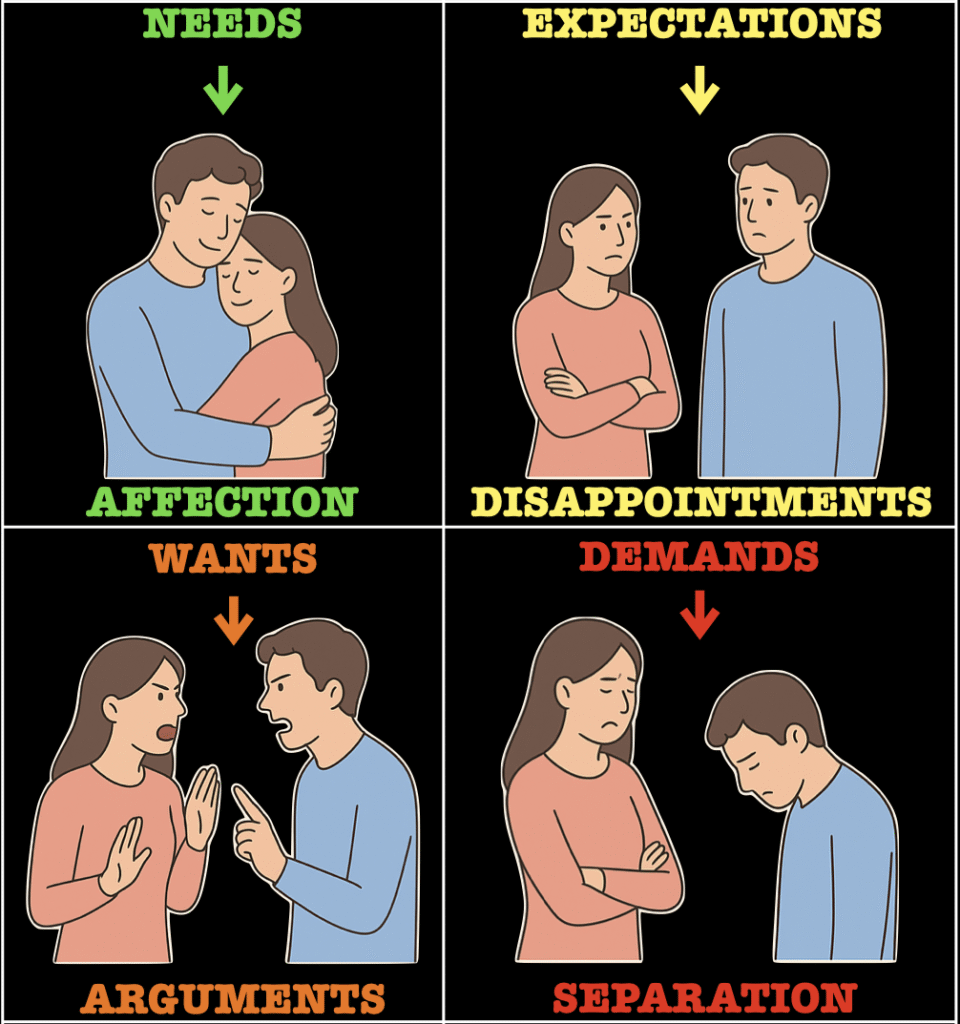
As you can see, while it’s necessary to communicate your needs in a relationship, going too far with expectations, wants, or demands can overwhelm your partner and damage the bond. Thus, it’s essential to distinguish between needs and wants and prioritize the former. You can achieve this by establishing clear, positive boundaries in the relationship.
Separating needs from wants becomes easier when you understand the various types of needs.
9 Different Types of Relationship Needs
There are nine broad types of relationship needs. Have a look:
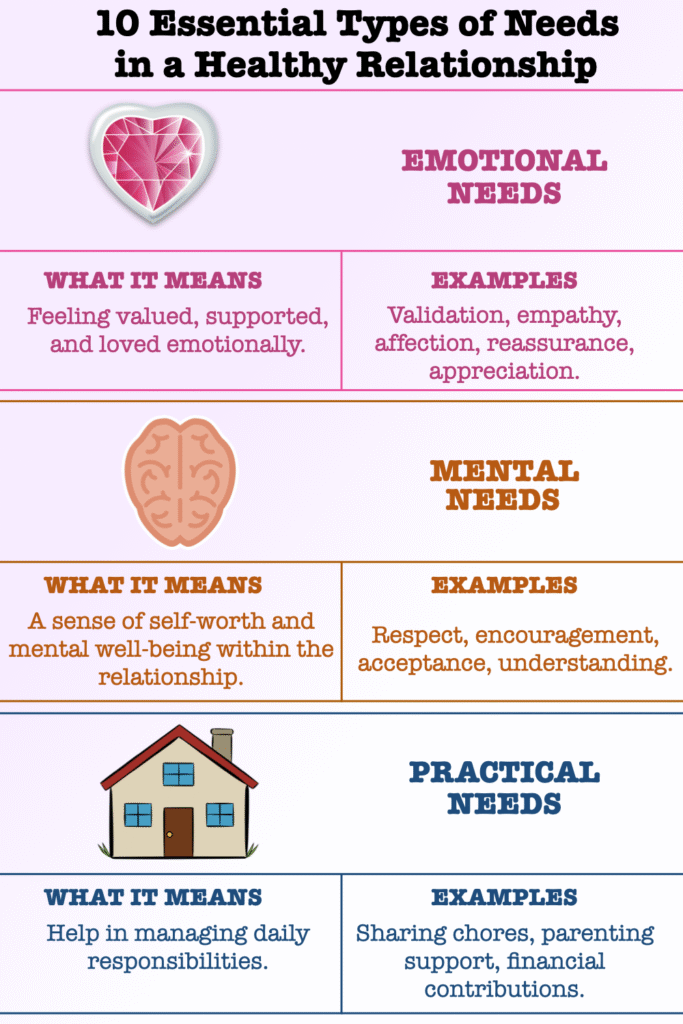
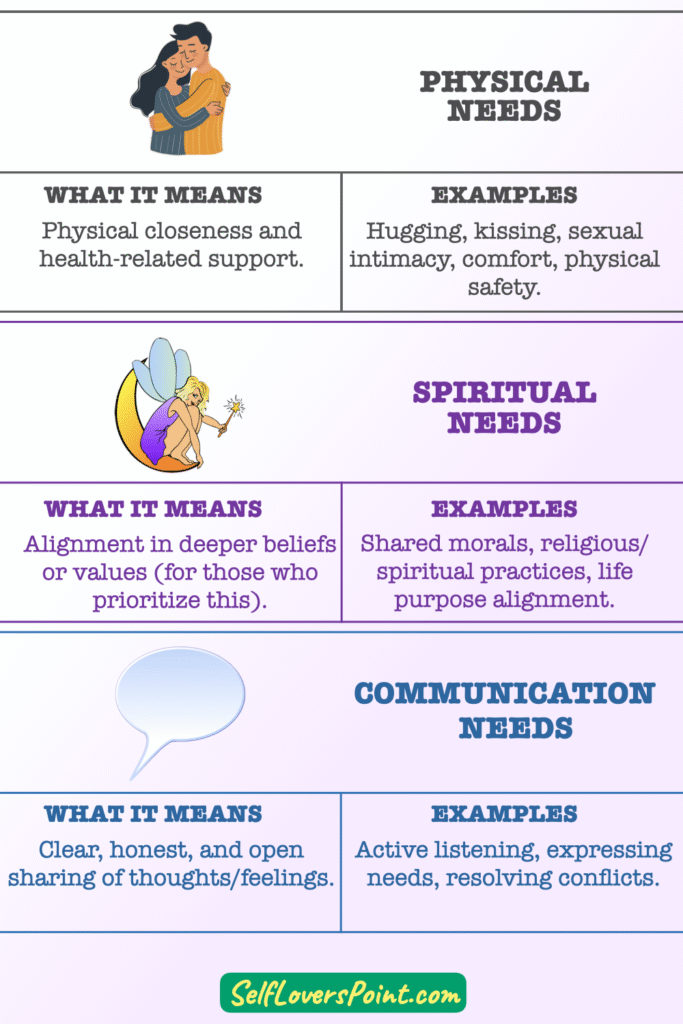
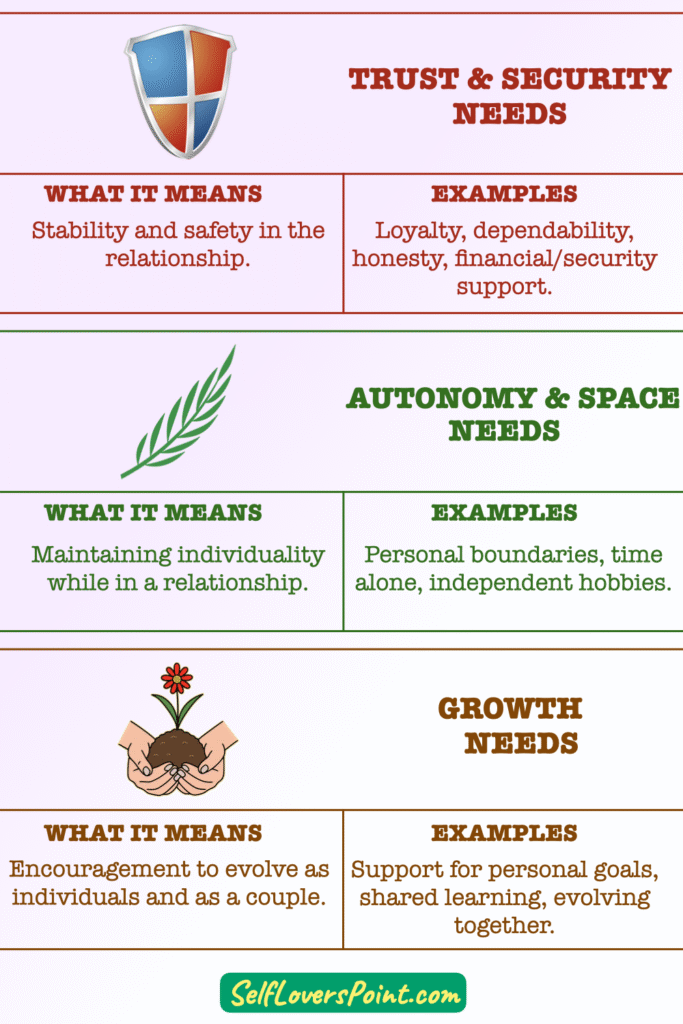
Knowing these relationship needs is necessary. But these needs also require effective communication. So, what are the ways to express our needs in a relationship?
6 Effective Ways to Communicate Your Needs in a Relationship
Here are the main ways in which you can voice your relationship needs to your partner.
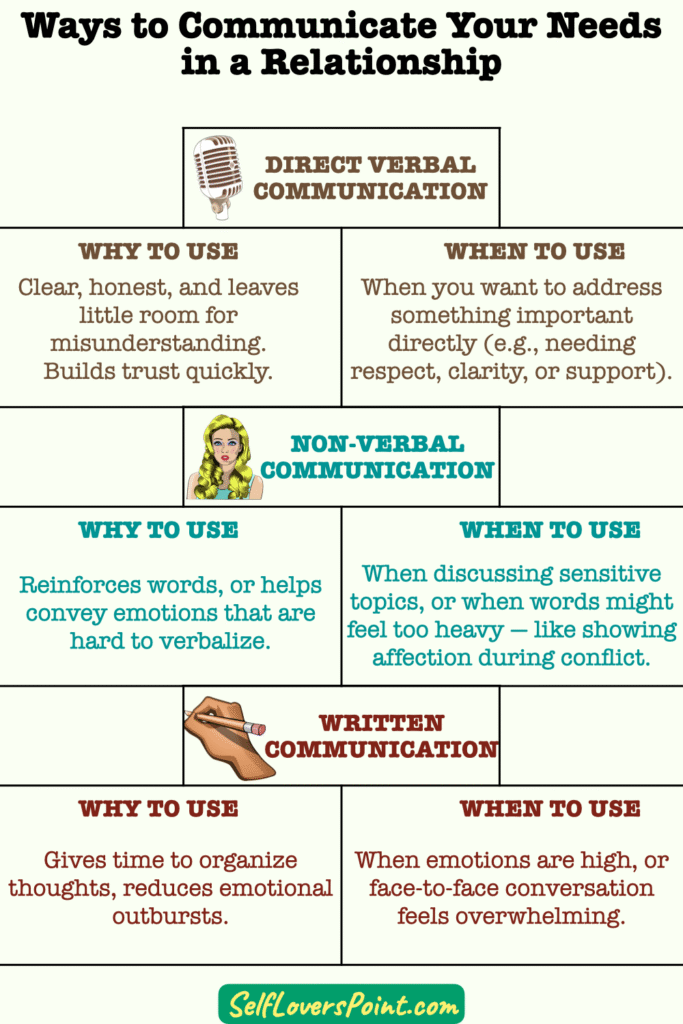
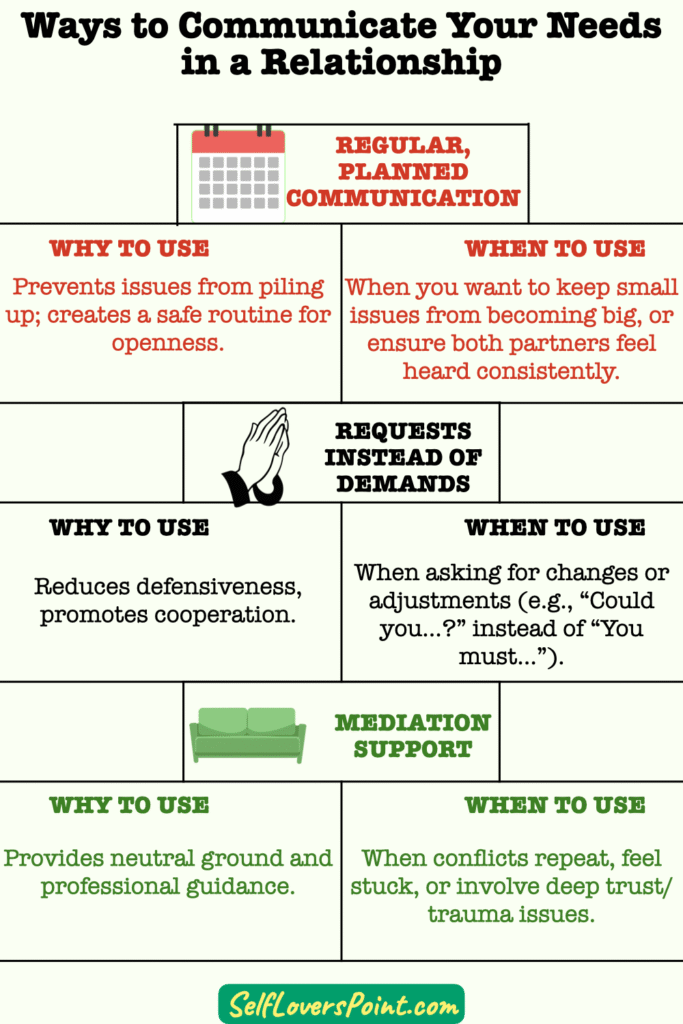
You may be familiar with all the above methods and still feel stuck when discussing your needs with your partner. Let’s find out the exact process of communicating your needs in a relationship.
How To Communicate Your Needs In A Relationship

The following steps to communicate your relationship needs to your partner are in the context of verbal communication.
Communicate Your Need Only When It’s Necessary
Communicating your needs is essential, but knowing when to do it and when to wait is also important.
When you try to express your needs too often, you risk coming out too ‘needy.’ It’s possible that your partner may start feeling overwhelmed and overlook your needs.
So, instead of communicating a need as soon as you sense it, try other subtle ways, for example, instead of talking directly about it, nudging your partner into fulfilling it.
So, if you feel lonely, ask your partner if they can come early from work so that you can spend some quality time together. Only when it doesn’t get fulfilled repeatedly, directly express your need to them – “I have been feeling lonely,” or “I need your attention.”
However, remember that communicating your needs only at the right time doesn’t mean you have to suppress them. It’s unhealthy. If you feel an urgent need, you should discuss it with your partner immediately. Your partner will sense the urgency in your tone and, instead of getting irritated, give you full attention.
Communicating your needs at the right moment can help alleviate unnecessary stress. It will give you the confidence to voice your needs whenever the need arises. Your concerns will get full attention from your partner without causing any discomfort to him. Over time, this will foster a stronger relationship.
Think What’s Troubling You And Why
Having utmost clarity about your needs is essential.
If you cannot identify or understand your needs, it will be difficult to explain them to your partner. There is a good chance that your partner may not understand it and overlook it as something unimportant.
If something has been troubling you but you can’t find out what it is, try going deeper. Take some time out, find a peaceful place, and reflect on the issue.
If you don’t feel at peace at first, you can start by meditating for a while. Then try asking yourself these questions –
What am I feeling? Why? What is lacking? Can I discuss it with my partner?
The answers you get will help you understand what you need in the relationship.
If thinking about it doesn’t work for you, you can also try journaling your thoughts into a safe space.
Remember: Ignoring or procrastinating are the last things you should do if something is troubling you. Please do not underestimate the issue or think it will resolve on its own. Sitting on it will only aggravate the situation and make you more desperate. So, acknowledge the problem, allot some focused, meaningful, and quiet time to understand what you need.
When you know exactly what’s happening with you and what you need, more than half the job is done. It makes you almost prepared to communicate your need to your partner.
Communicate One Need At A Time
In a given instance, focus on communicating one single need to your partner – Your most important need in that moment.
Expressing multiple needs in a given moment may feel like an emotional ambush to your partner. Instead of your needs sounding genuine, it may feel pressurizing or even complaining to them. They might feel overburdened and get defensive, and your needs might go unnoticed.
The way to do it is simple. If you have multiple needs, create a list of them in order of priority.
Start by communicating the first need, which will be the most burning in that moment for you.
For the rest of them, space them out and time them right. Keep visiting the list regularly to strike out the ones that are no longer valid.
This way, all your needs will be fulfilled one by one without making it overwhelming for your partner.
To give you an idea, suppose you feel the need for three things from your partner: honesty, appreciation, and respect.
Rewrite the list based on priority. Generally, respect would come first, followed by honesty and appreciation. But for you, it depends on your suitability. See the lack of which one of the three is bothering you the most in that moment. Go with that one first and save the rest for later.
Remember: Avoid sounding too ‘needy’ or too ‘pushy’ with your need. Just put it out in a firm but respectful way to your partner.
When you communicate a need with complete honesty, clarity, and respect, your partner is more likely to react positively to your concern. It will not only make you feel attended but will also raise the trust factor in the relationship.
Use Communication Aids Smartly
Love has its own language, and most heart-to-heart messages are received well. However, you still need to convey your message, which requires an effective communication style.
If you do not use the right communication aids, your needs may not get the attention they deserve. Your partner may not understand what you need or may fail to understand its relevance. In both cases, your need might go unfulfilled.
There are certain things to keep in mind when communicating your needs to your partner.
Begin by explaining the background story so that they understand the logical roots of your need. Tell them things like, ‘Since when have you been feeling it, and why?’ Explain how it made you feel so that they can relate and feel connected to your emotions. It can be something like –
“Last month, when I was sick and you went out with your friends, I felt as if I didn’t matter to you. I really needed you by my side.”
You can also use subtle body language to convey your emotions, such as looking down in pain.
Explain to them why you didn’t say anything earlier. Say something like – “I didn’t want to trouble you as you looked busy.” It will show empathy even when you are in pain, which will have a positive impact on your partner.
Move ahead by encouraging them and saying, “You have always been there for me,” before putting forward the polite request.
Finally, tell them what you need – “I would feel better if you showed a little more care.”
Please provide them with an instance where you felt cared for by them, so they know exactly what to do. Say something like –
“Remember, when we started going out and you cancelled your plans with your friends just to be with me? I felt really special then.”
Ultimately, ask them how they feel about it. Having struck the right chords, your partner now not only understands your needs clearly but is also sorry and willing to make amends.
Remember not to overdo any step, as it may prove counterproductive. For example, giving too many instances when you felt bad can come across as being critical and make your partner go on the defensive.
Another thing you can do to achieve the best outcome is to visualize the whole situation before actually doing it. It will help you gain clarity on exactly what to do.
When you learn to use communication to good effect, it not only helps you voice your needs effectively but also strengthens communication as a whole in the relationship.
10 Signs Your Partner Truly Understands and Hears Your Needs
How do you know if you communicated your needs effectively? There are subtle signs to look for in your partner while you speak to them. Take a look.
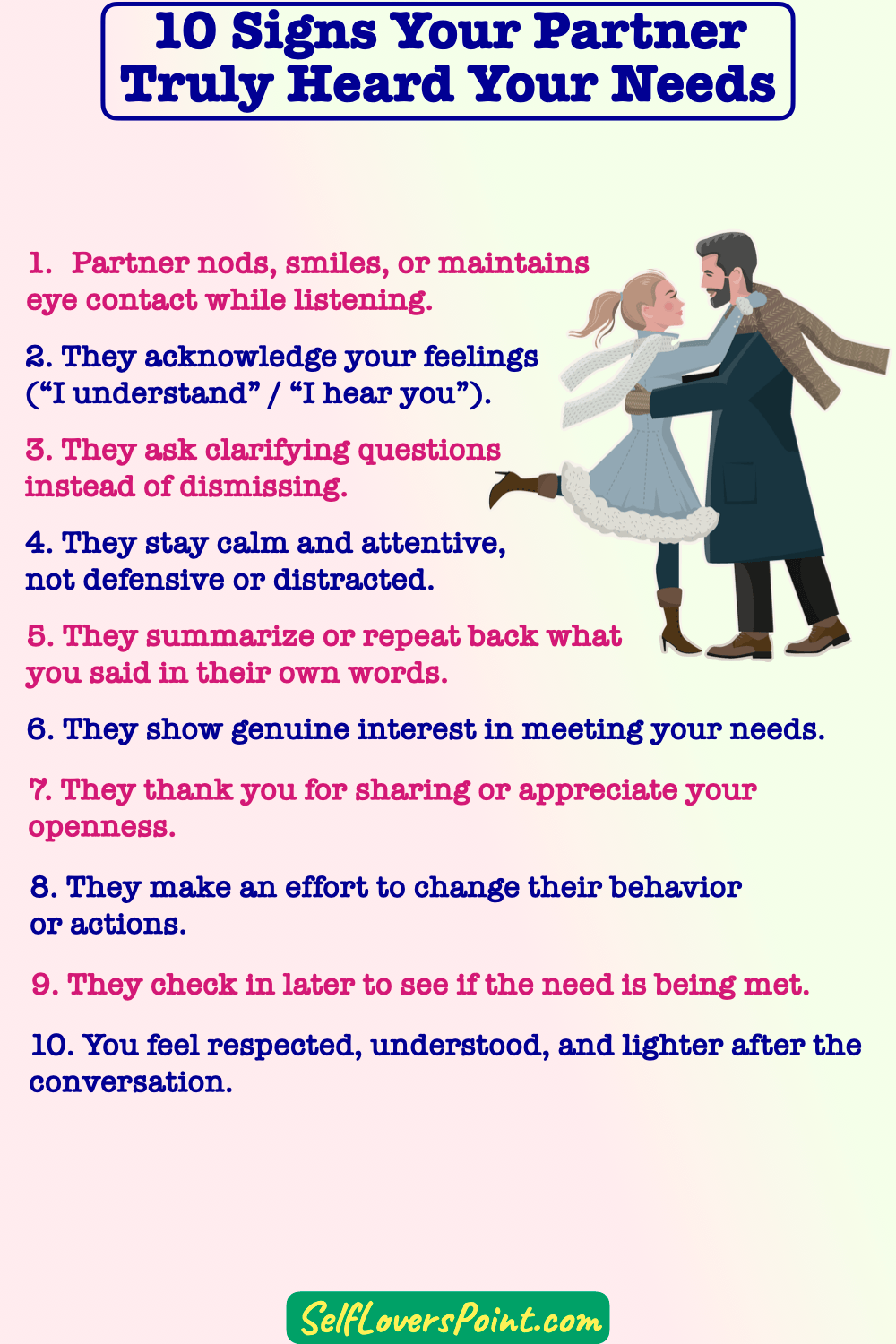
Be Patient
Relationship needs require as much patience as they need expression.
It’s unlikely that your needs will be fulfilled as soon as you voice them to your partner. Any change takes time, and even if your partner acknowledges your needs, it will take them some time to implement them. They may not remember it at first or fail to get it right a few times before finally achieving it. You need to stay patient all this time.
Patience can be challenging, especially when it involves ‘needs.’ To keep it, be content with the fact that your partner agreed to fulfil them. Be forgiving when your partner fails to deliver on their initial promises. Stay positive and continue to believe that your needs will be respected eventually.
When your partner fails and apologizes for it, replying with a simple encouragement, such as “I believe in you,” can go a long way in helping you stay patient with them.
Remember: Patience doesn’t mean giving up on your needs or the hope that they will eventually get fulfilled. It means giving your partner the time they need to make it happen. If they say they will do it, appreciating and trusting them is the best course of action.
Patience always pays off. When you are patient with your partner, they slowly fulfill your relationship needs. It raises your trust in them, the bond enriches, and the relationship flourishes.
Appreciate Your Partner To Let Them Know
When your partner fulfils your needs, do not forget to appreciate them.
Appreciation in a relationship, especially when it’s due, can make or break the relationship. If you fail to acknowledge your partner’s efforts, it may discourage them, and they might ignore your needs the next time. As a result, discontent in the relationship may rise, leading to frequent arguments.
Simple words of appreciation and expressing what worked can do the job. When your partner fulfills your need, say something like, “Thank you for remembering,” or “You are the best,” or “This is what I wished for.” Doing this makes your partner feel validated, which prepares them for fulfilling your future needs.
While appreciating your partner, remember to convey your affection genuinely and sincerely. Keep a smile on your face and thank them in a way that makes them feel good about themselves.
When you appreciate your partner’s effort, you open the door to fulfilling future needs. However, appreciation goes beyond this in a relationship. They turn a couple into best buddies who enjoy each other’s company and grow together. Appreciation in relationships is like watering a plant so that it becomes a full-grown tree with dense shade.
Dare To Speak Up

Communicating your relationship needs brings hope, but it can also create fear and hesitation within you. You may feel scared about whether your partner will take it the right way or if they will be emotionally unavailable. It’s a genuine concern, but it shouldn’t stop you from voicing your needs.
Remember: Only when you express your needs boldly will they stand a chance to be fulfilled. Needs in a relationship aren’t debatable because they shape not only the relationship but also your individuality, personality, and identity. So, dare to speak up in the relationship when it matters the most!
Put it the right way in front of your partner, and they will fulfill every need that helps you be your best self.
FAQs
How to deepen your connection with your partner?
Deepening a connection with your partner requires time, patience, and effort. It needs you to understand each other’s needs and fulfil them. When needs are fulfilled in a relationship, closeness—physical, mental, and emotional — increases. You spend more time together, which deepens the connection.
What are unmet needs in a relationship?
When your partner doesn’t fulfil the bare minimum requirements that are essential for safeguarding your individuality and inner peace, it gives rise to unmet needs in the relationship. These unfulfilled relationship needs also affect your ability to contribute positively to the relationship. For example, if your partner doesn’t appreciate you, you may feel worthless and ignored in the relationship.
Are my needs being met in the relationship?
If you know your needs and have expressed them to your partner, but even after repeated requests, they remain unfulfilled, it indicates that your relationship needs are not being met. A simple rule of thumb to confirm fulfilled needs is whether or not you feel content in the relationship.
How to tell your partner your needs aren't being met?
Choose a time when both you and your partner are free and relaxed. Take them to a quiet place. First, discuss the needs they have fulfilled and express appreciation for them. Then, without sounding irritated or critical, reveal the unmet need. Remember to look a bit concerned and use your body language to get their full attention.
How to communicate your needs without being needy?
To avoid appearing needy while communicating your needs, do not talk too often or too much about your needs. Also, do not show too much emotion while expressing them. Instead of sounding pleading, sound concerned about your needs. Instead of showing desperation, portray your needs as something that will help the relationship.
Can being too needy ruin a relationship?
Yes, being too needy in a relationship might come out as desperation to your partner. They may feel overburdened with your needs, which might lead to emotional burnout. Being too needy can also make one feel insecure and anxious all the time, which might impact the relationship negatively.
How do you know you're not a priority?
If your partner ignores your urgent needs for not-so-important work of theirs, you may not be a priority for them. For example, instead of pulling you out of loneliness, they prefer to go out with their friends, which might indicate that you are not that important in the relationship.
How do you know someone is not right for you?
There are three yardsticks on which you can measure your partner’s suitability for you. First is compatibility. If fights happen for not-so-important reasons, you may not be right for each other. Second comes the connection and chemistry. If you don’t feel comfortable with them or they do not treat you the way that is respectful and caring, they might not be right for you. Finally, if your partner casually and frequently talks about breaking up with you over every little thing, they might not be right for you.


